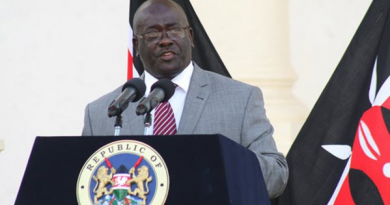GoK receives accolade in its fight against corruption
By Beth Nyaga
The Government of Kenya has received accolades in its fight against corruption with the World body charged with addressing corruption and crime in the world calling for concerted efforts by all arms of government to ensure that Kenya attains a corrupt free status by the year 2030.
The Second Review Workshop on the UN Convention against Corruption (UNCAC) currently taking place in Nairobi has observed that Kenya has made significant strides after instituting legislation criminalizing corruption while undertaking measures to arrest, freeze and seize illicit wealth.
Kenya was the first country in the world to sign and ratify UNCAC when the Convention was opened up for signature on 9thDecember, 2003.
The UNCAC Convention introduces a comprehensive set of standards, measures and rules that all countries can apply in order to strengthen their legal and regulatory regimes to fight corruption.
It calls for preventive measures and the criminalization of the most prevalent forms of corruption in both public and private sectors.
The Convention complements the United Nations Convention against Transnational Organized Crime.
Kenya is also one of the Founder Members of the International Anti-Corruption Academy (IACA), which is dedicated towards building competent human resource capacity for effective onslaught against corruption.
During the first stage of Review, the key areas of concern for Kenya was development and enactment of legislation while the second stage will focus on the prevention and asset recovery of illicit wealth as part of its anti-corruption intervention campaign.
Tim Steele, the Regional Advisor of the United Nations Office on Drugs and Crime (UNODC) for East and Southern Africa Region, in his remarks observed that Kenya had shown great commitment by strengthening its institutions to fight corruption.
Ramses Malaty, the Deputy Head of Mission of the Finnish Government has observed that the Kenyan government while strengthening its mechanisms for crime detection and prosecution was also empowering its citizens in addressing and reporting corruption issues.
Kenya’s Attorney General, Professor Githu Muigai while launching the Second Review Workshop on the UN Convention against Corruption (UNCAC) confirmed that the country had already aligned its laws with UNCAC leading as parts of its efforts towards leading to the implementation of a single vision in curbing corruption.
Professor Muigai noted that while issues of corruption and anti-corruption remained centerpiece in everyday conversation in Kenya, there was need to know the outcome of the review of Kenya’s implementation of UNCAC that was undertaken by Cape Verde and Papua New Guinea, member states of UNODC between 2013 and 2015.
The country’s Chief Legal Advisor stated that corruption if left unattended would continue to mock the developmental gains of our young democracy.
He further confirmed that after successful adoption of critical laws on corruption, the government was now focusing on prevention and asset recovery as part of its anti-corruption intervention campaign on illicit wealth.
“Over the last 12 years, the Government has initiated diverse legal and institutional reforms geared towards combating corruption. This has involved the enactment of various anti-corruption laws and establishment of various watchdog and anti-corruption bodies. The Government is currently working on a number of Bills, which upon enactment will make a significant contribution to our anti-corruption arsenal. These include the Bribery Bill; the Access to Information Bill, as well as the Whistleblower Protection Bill,” the Attorney General stated.
Tanja Santucci, the Officer in Charge, Corruption and Economic Crime at UNODC, in Vienna, Austria observed that the country had already established a multi-agency framework that brought together relevant law enforcement agencies in its fight.
The multi-agency framework on corruption in Kenya includes the Asset Recovery Agency, Directorate of Criminal Investigations, Ethics and Anti-Corruption Commission, Central Bank of Kenya, Financial Reporting Center, Kenya Revenue Authority, Directorate of Public Prosecution and Office of Attorney General.
The multi-agency and multi-disciplinary approach use the strengths of the various institutional mandates to jointly trace and freeze assets, investigate corruption incidences and bring to prosecution the perpetrators of corruption including cases involving senior government officials at both National and County Governments.
The government through the multi-agency and multidisciplinary approach also seeks to introduce into the education curricula of the country studies on leadership, ethics and integrity for all its citizens. Accordingly, all new civil servants will receive education on corruption and economic crimes while being inducted into service.
The government is also working on the ratification of UNCAC through the International Anti-Corruption Academy (IACA) to pave way for advanced training of anti-corruption officers, judicial officials as well as prosecutors to effectively deal with the vice of corruption.
The Attorney General reiterated the importance of collaboration between various actors in the fight against corruption, especially the National Assembly and the Judiciary stressing that the appreciation of all partners in facilitating prevention, investigation, asset tracking and recovery, prosecution and conviction should not be so easily sacrificed on the altar of expediency.





